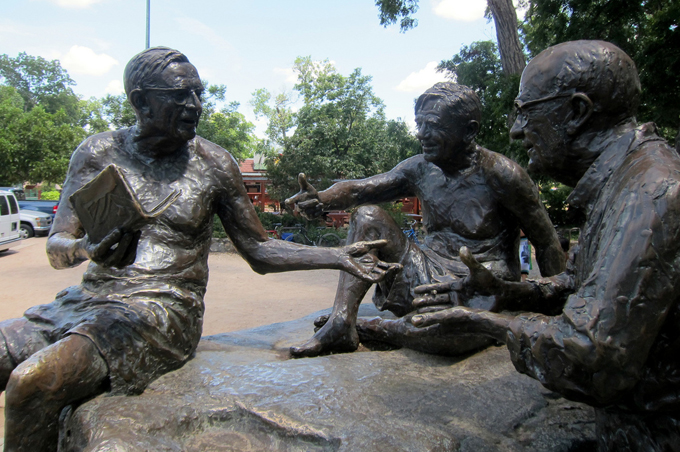 As it turns out, Austin, TX, is more than live music, bat watching, and breakfast tacos. The city is home to one of the most prestigious writing programs in the country and a vibrant literary scene that attracts major book festivals, author meetups, and other literary happenings. As one native gushes, “the city is a book lover’s paradise.”
As it turns out, Austin, TX, is more than live music, bat watching, and breakfast tacos. The city is home to one of the most prestigious writing programs in the country and a vibrant literary scene that attracts major book festivals, author meetups, and other literary happenings. As one native gushes, “the city is a book lover’s paradise.”
It makes sense, when you think about it; Austin has a reputation as an incubator for creative, inclusive, forward-thinking industries, and its book scene is no different. Amid challenging times, small-but-mighty presses continue to crop up and generate a new wave of publishing in Austin—one that elevates underrepresented voices, lesser-known talents, and niche tastes. The success of this countermovement is a testament to the city’s thriving literary community.
Make the most of your time in Austin by visiting a few of these local literary lures before, during, or after the International Literacy Association’s (ILA) 2018 Conference, July 20–23.
Literary landmarks
The Harry Ransom Center at the University of Texas at Austin: Literary quotes are etched on the windows of this world-renowned humanities research library and museum. In addition to its rotating exhibits, the museum houses millions of literary artifacts, including extensive manuscripts of James Joyce, Anne Sexton, and David Foster Wallace; three copies of the First Folio of William Shakespeare’s plays; and a journal kept by Jack Kerouac while writing On the Road.
The Nettie Lee Benson Latin American Collection: Also at the University of Texas at Austin, this library holds the largest university collection of Latin American materials in total number of volumes in the United States. The collection features more than a million volumes along with a wealth of original manuscripts and media, including the papers of prominent literary figures such as Américo Paredes, Gloria Anzaldúa, and Rolando Hinojosa.
The O. Henry Museum: A memorial to one of Austin’s most famous writers, the museum offers visitors a look at his colorful life, period furniture, and personal belongings, which include unpublished manuscripts. The museum is free and open to the public Wednesday through Sunday and often hosts literary events (including an annual “pun-off”).
Philosophers’ Rock at Barton Springs: Created by sculptor Glenna Goodacre in 1994, this bronze statue depicts authors J. Frank Dobie, Roy Bedichek, and Walter Prescott Webb, who used to gather at the pool for “Austin’s first literary salon.” Today, Philosophers’ Rock welcomes visitors to Barton Springs, a popular swimming hole (and ideal reading spot).
Events
The 21st Annual ILA Poetry Olio: Join us on Saturday, July 21 from 7:30 p.m. to 9:30 p.m. for an evening of verse and skits performed by featured poets and surprise guests, interspersed with audience participation readings and skits, a poetry contest, and valuable prizes.
ILA’s Informal Storytelling Gathering: Listen to factual and fictional stories or share one of your own at ILA’s annual Informal Storytelling Gathering, taking place on Sunday, July 22, from 7:30 p.m. to 9:30 p.m. During Part 1, featured storytellers will present a mixture of story types, including historical stories, ballads, and folktales that are appropriate for use in classrooms from preschool through secondary classes. Any audience member who wishes to speak may sign up to tell his or her story during Part 2 of the event.
Austin Poetry Slam: Occurring every Tuesday night at the Spider House Ballroom, the raucous competition showcases 13–15 local and touring artists, whose performances are judged by members of the audience. Previous participants include award-winning poets such as Andrea Gibson, Sister Outsider, and Ebony Stewart.
Shops and eats
BookPeople: The largest independent bookstore in Texas, BookPeople is known for its friendly atmosphere, extensive inventory, handwritten recommendations, and almost daily events. The building’s stairwells are filled with pictures of well-known visitors, including Hillary Clinton, David Sedaris, and George Saunders.
Smaller independent bookstores: Save time to explore the city’s scattering of brick and mortar bookstores, most of which double as communal spaces to hold book readings, open mic nights, author presentations, book clubs, and more. The eclectic lineup includes Resistencia Books, a bookstore, small press, political forum, and performance venue that highlights Chicanx, Native American, and Latinx voices; BookWoman, a long-running feminist and queer bookstore; Malvern Books, which specializes in emerging voices and translated works; and Monkeywrench Books, an “all-volunteer, collectively-run, radical bookstore” that carries titles focused on social and economic justice.
Academia: A thinking bar, the owner describes Academia as “a figurative faculty lounge for late, great literary icons.” The space is decorated with custom-designed banners that pay homage to Ernest Hemingway, Dorothy Parker, F. Scott Fitzgerald, and Hunter S. Thompson. Each banner features a crest with unique iconography and symbolism representing the author and his or her works, personality, trademarks, and drink of choice. Projected animated graphics spotlight entertaining quotes from other famous writers.
Bennu Coffee: This 24-hour coffee shop offers signature drinks named after iconic literary works. Popular orders include The Scarlet Letter, made with ancho chile-spiced chocolate and barista chips; The Raven, a dark chocolate mocha topped with whipped cream; and Don Quixote, an Azteca d’Oro spiced chocolate mocha.
Alina O’Donnell is the communications strategist at ILA and the editor of Literacy Daily.